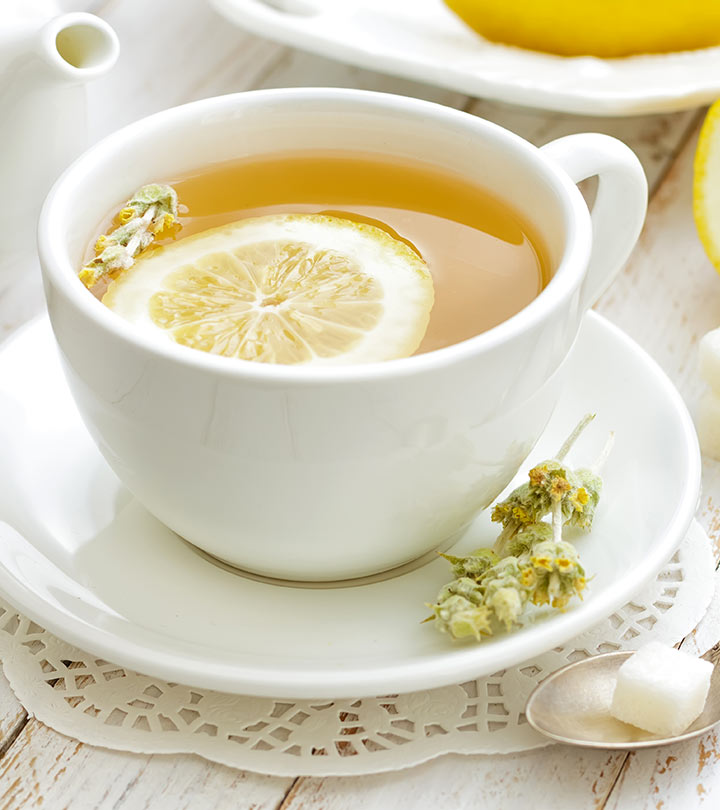Taking a freshly brewed dose of lemon tea in the morning not only leaves you feeling refreshed, but also has important health advantages. The benefits of lemon tea are immense. The tea is low in calories, and may reduce cancer risk, promote heart health, regulate blood sugar levels, soothe a sore throat, and detoxify your body. Here, we discuss the health benefits of this tangy beverage, its preparation process, any possible risks, and the precautions you need to take. Keep reading to know more.
In This Article
What Is Lemon Tea?
Lemon tea is a refreshing beverage that you can easily make at home. It is nothing but a form of black tea or green tea liquor to which lemon juice has been added. The addition of lemon juice not only makes its color more pronounced but also improves its taste. But, for the perfect taste, you should add the right quantity of lemon juice to it.
Did You Know? Every country has its own traditions, and the same is true for how they drink their tea. The British, Tibetans, and Indians prefer having milk in their tea. The Han Chinese opt for a tea decoction without milk. Russians and Italians prefer having tea with lemon juice. In Poland, tea is served with a slice of lemon.
What are the benefits of lemon tea? Let’s find out in the following section.
Related: 12 Best Benefits Of Lemon Ginger Tea For Health, Skin, And Hair
Health Benefits Of Lemon Tea
1. Has Antioxidant And Anti-Inflammatory Properties
The vitamin C in lemon has potent antioxidant and anti-inflammatory properties. It acts against several infections and protects your body from environmental oxidative stress. It also boosts the immune system and reduces inflammation (1). Citrus fruits like lemon contain flavonoids that fight free radicals. The anti-inflammatory properties of citrus fruits can reduce the risk of degenerative diseases (2).
Fun Fact Lemons were one of the first citrus fruits to arrive in the Mediterranean and were consumed only by the wealthy as a luxury fruit.
Lemon tea is said to possess antibacterial activity that can act against certain bacteria like Streptococcus mutans and Lactobacillus acidophilus. Also, lemon tea is more effective than green and black teas in acting against these bacteria (3).
2. May Have Anti-Cancer Activity
Citrus fruits contain several compounds like flavonoids and limonoids that possess anti-cancer properties (4). These compounds help reduce the risk of gastric cancer, breast cancer, and colon cancer. The antioxidants in lemons prevent the growth of cancer cells. Quercetin, a flavonoid in lemon, has anti-cancer properties. This flavonoid can block the growth of human cancer cells at the different phases of the cell cycle (5), (6).
3. May Improve Heart Health

Image: Shutterstock
Lemons, a great source of vitamin C, can improve heart health. Vitamin C can inhibit atherosclerotic (build-up of fats and cholesterol in and on the artery walls) lesions (7). Other flavonoids in lemons like hesperidin and diosmin may help improve cardiovascular health (8). Lemon tea intake may also lower blood pressure and boost heart health (9).
4. May Aid In Digestion
Lemon tea facilitates healthy digestion through its calming effect. It is known to eliminate toxins and waste products, enabling your body to absorb more of the beneficial compounds in food. Lemon with warm water may help cleanse the digestive tract by flushing out the toxins and improve your digestion (10).
5. May Boost Mental health
Citrus fruits may help reduce the risk of mental illnesses (11). Such fruits may help in the treatment of anxiety disorders and Alzheimer’si XA neurologic condition that gradually worsens, shrinks, and kills brain cells, causing severe confusion and memory loss. (12). The rejuvenating aroma of lemon tea also may boost one’s mood and potentially reduce anxiety.
6. May Regulate Blood Sugar Levels

Image: Shutterstock
The flavonoids in lemon, like hesperidin and eriocitrin, were found to suppress oxidative stressi XA condition caused by an imbalance between the creation and buildup of oxygen radicals in cells and the ability to detoxify them. in diabetic rats (13). These flavonoids may lower blood sugar levels and decrease the risk of diabetes. Also, the citric acid in lemon juice may help prevent certain complications associated with type 2 diabetes (14). Lemon has a low glycemic indexi XA value assigned to foods containing slow-digesting carbohydrates, which tend to release blood glucose slowly and steadily. , making them good for managing blood sugar levels.
Related: Easy Ways To Lower Blood Sugar Naturally And Safely
7. May Soothe A Sore Throat Or Cough
Lemon tea helps relieve cold and flu symptoms. Lemon will give you relief from a sore throat and cold (15). The liquid helps thin the mucus in your throat. Lemon juice and honey mixed in warm water can soothe your throat. Drinking lemon together with honey may also help reduce cough and improve the quality of your sleep (16).
8. May Treat Post-Operative Swelling
Surgical swelling or edema is a common post-operative condition and is caused by injections, dead cells of fat, and pooled fluid blood. The fluids get accumulated in between the body tissues, causing pain and discomfort. Lemon tea is often recommended by doctors for reducing and alleviating the condition of edema. Apart from this, lemon tea may also eliminate the toxic effects of anesthesia and reduce the pain during the menstrual cycle. However, research is limited in this regard. More information is warranted.
Related: 25 Remedies To Treat Edema Naturally + Signs, Causes, & Types
9. May Detoxify The Body

Image: Shutterstock
Lemon tea works as an excellent detoxifier and removes toxins from the body. The toxins that are otherwise accumulated in the liver may cause various infections. The citric acid in lemon tea can decrease liver damage (17).
10. May Enhance Skin Health
The vitamin C in lemons is said to possess anti-aging properties. It offers protection against UV-induced photo-damage. It also stimulates collagen production and reduces wrinkle formation (18).
Other Health Benefits Of Lemon Tea
- The vitamin C in lemons improves immune health (19).
- The antioxidants in lemon tea, which are combined with its invigorating aroma may relieve headaches (20).
- The citric acid in lemons may help in reducing the risk of developing kidney stones (22).
These are the potential benefits of drinking lemon tea. But how do you make lemon tea? Keep reading to know.
How To Make Lemon Tea?

Image: Shutterstock
You can prepare lemon tea easily by adding the ingredients in the right proportions. Given below is the simple method of preparing a lemon tea recipe.
Ingredients
- 1 cup of water
- Freshly squeezed lemon juice
- 1 teaspoon of tea leaves
- Sugar or honey, for taste
Procedure
- Place a cup of water for heating.
- As the water boils, put off the flame.
- Add ½ a teaspoon or ¾ teaspoons of tea leaves (depending upon whether you want a stronger or a lighter version of the tea).
- Alternatively, you can use green tea in the same proportions.
- Leave it to brew for about 2 to 3 minutes.
- Add a quarter portion of lemon juice to the tea liquor.
- Add sugar or honey for taste. Your lemon tea is ready.
You can make this tea more flavorful by adding fresh ginger. You may also add some mint leaves for enhanced health benefits. Adding a pinch of rock salt may boost its taste too. You may also drink freshly prepared lemon tea with ginger before bed. It may improve your metabolism and immunity.
This is how you can prepare this tangy beverage easily at home. But can you take this tea every day?
Can You Drink Lemon Tea Every Day?
Yes, you can drink lemon tea every day. But remember that excess consumption may cause some adverse effects. We will briefly explore them in the following section.
Risks Associated With Lemon Tea

Image: Shutterstock
- Tooth Erosion: Acidic beverages are usually known to increase the risk of tooth erosion (22). In high concentrations, lemon tea may erode the tooth enamel over time.
- Heartburn: Citrus fruits can aggravate the symptoms of gastroesophageal reflux disease (GERD) (23). Hence, excess consumption of this tangy beverage may irritate your stomach and cause acid reflux.
- Canker Sores: Intake of excess lemon tea may irritate the mucous membranes and potentially lead to canker soresi XA painful, shallow sore that develops inside the mouth or at the gum line, brought on by stress, acidic foods, or injury. . In extreme cases, lemon may trigger dehydration in the body and make canker sores worse. However, research is limited in this regard.
You should take certain precautions while having lemon tea. Lemons are acidic in nature and are not recommended for everyone. Read on.
Precautions To Be Taken
In spite of its various benefits, lemon tea is not suitable for all. Certain precautions need to be taken.
- Lemon tea is generally not suitable for kids.
- It should better be avoided during pregnancy and breastfeeding.
Note: Lemons are beneficial during pregnancy as they help prevent nausea. However, pregnant and lactating women should consult the doctor before consuming lemons.
- Those with high blood pressure should refrain from regular consumption of lemon tea.
- Lemon tea should not be consumed by those with diarrhea or irritable bowel syndrome. You can consume plain black tea instead.
- It is advisable to take medical advice before consuming lemon tea along with any other medications.
Key Takeaways
- Lemon tea lowers cancer risk, enhances heart health, controls blood sugar levels, heals the sore throat, and improves overall health.
- To prepare lemon tea easily at home, all you need is a cup of water, freshly squeezed lemon juice, one teaspoon of tea leaves, and sugar or honey for taste.
- However, excessive consumption may cause adverse effects like tooth erosion, heartburn, and canker sores.
The benefits of lemon tea are numerous. It protects the body from many infections, exhibits anti-cancer properties, improves cardiovascular health, aids in digestion, boosts mental health, regulates blood sugar levels, soothes a sore throat, treats postoperative swelling, removes toxins from the body, enhances skin health, and improves immunity. Lemon tea can be made at home with simple ingredients. Although this tea offers an array of health benefits, it may have a few side effects like tooth erosion and heartburn if consumed in excess. Therefore, consume it in moderation.
Frequently Asked Questions
Is it good to drink lemon tea at night?
Yes. In fact, many people swear by herbal tonics made using lemon for a soothing effect and easy slumber at night.
Which is better – lemon tea or green tea?
Lemon tea is not exactly a tea brew like green tea is. Lemon is an ingredient you can add to tea, also your green tea, for complementary benefits. However, if you are comparing the benefits of green tea versus lemon water (which is what it is without tea leaves), then lemon water is better as it does not contain caffeine.
Subscribe
References:
Articles on StyleCraze are backed by verified information from peer-reviewed and academic research papers, reputed organizations, research institutions, and medical associations to ensure accuracy and relevance. Read our editorial policy to learn more.
- 1. Vitamin C and Immune Function
https://pubmed.ncbi.nlm.nih.gov/29099763/ - Citrus Essential Oils (CEOs) and Their Applications in Food: An Overview
https://www.ncbi.nlm.nih.gov/pmc/articles/PMC7154898/ - Comparative assessment of antibacterial efficacy of aqueous extract of commercially available black, green, and lemon tea: an in vitro study
https://www.ncbi.nlm.nih.gov/pmc/articles/PMC5654184/ - Citrus fruits as a treasure trove of active natural metabolites that potentially provide benefits for human healthhttps://www.ncbi.nlm.nih.gov/pmc/articles/PMC4690266/
- Citrus limon from Tunisia: Phytochemical and Physicochemical Properties and Biological Activities
https://www.ncbi.nlm.nih.gov/pmc/articles/PMC5820557/ - Quercetin and Cancer Chemoprevention
https://www.ncbi.nlm.nih.gov/pmc/articles/PMC3136711/ - Vitamin C and cardiovascular disease: a systematic review
https://pubmed.ncbi.nlm.nih.gov/9100087/ - Beneficial Effects of Citrus Flavonoids on Cardiovascular and Metabolic Health
https://www.ncbi.nlm.nih.gov/pmc/articles/PMC6431442/ - Effect on Blood Pressure of Daily Lemon Ingestion and Walking
https://www.ncbi.nlm.nih.gov/pmc/articles/PMC4003767/ - SAY YES TO WARM FOR REMOVE HARM: AMAZING WONDERS OF TWO STAGES OF WATER!
https://www.ejpmr.com/home/abstract_id/220 - Lemon as a source of functional and medicinal ingredient: A review
https://www.researchgate.net/publication/336135127_Lemon_as_a_source_of_functional_and_medicinal_ingredient_A_review - Citrus Essential Oils (CEOs) and Their Applications in Food: An Overview
https://www.ncbi.nlm.nih.gov/pmc/articles/PMC7154898/ - Protective effects of lemon flavonoids on oxidative stress in diabetic rats
https://pubmed.ncbi.nlm.nih.gov/9688172/ - Citric acid inhibits development of cataracts, proteinuria and ketosis in streptozotocin (type1) diabetic rats
https://www.ncbi.nlm.nih.gov/pmc/articles/PMC2917331/ - Home Remedy Use Among African American and White Older Adults
https://www.ncbi.nlm.nih.gov/pmc/articles/PMC4631220/ - Honey with lemon Improves Children`s Nocturnal Cough and their Sleep Quality as well as Their Parents
http://www.journalijar.com/uploads/653_IJAR-5897.pdf - Plants Consumption and Liver Health
https://www.ncbi.nlm.nih.gov/pmc/articles/PMC4499388/ - The Roles of Vitamin C in Skin Health
,
https://www.ncbi.nlm.nih.gov/pmc/articles/PMC5579659/ - Immune-enhancing role of vitamin C and zinc and effect on clinical conditions
https://pubmed.ncbi.nlm.nih.gov/16373990/ - The effect of lemon on the essential element concentrations of herbal and fruit teas
https://www.researchgate.net/publication/302976856_The_effect_of_lemon_on_the_essential_element_concentrations_of_herbal_and_fruit_teas - Medical and Dietary Therapy for Kidney Stone Prevention
https://www.ncbi.nlm.nih.gov/pmc/articles/PMC4265710/ - Acidic beverages increase the risk of in vitro tooth erosion
https://www.ncbi.nlm.nih.gov/pmc/articles/PMC2516950/ - Risk factors for gastroesophageal reflux disease: the role of diethttps://www.ncbi.nlm.nih.gov/pmc/articles/PMC4223119/
Was this article helpful?
“>
Related
The following two tabs change content below.
- Reviewer
- Author

Bulelani Makapela, RD
Bulelani Makapela is a registered dietitian based in East London, South Africa. She has an interest in clinical and community nutrition and food service management. She is passionate about nutrition education as she believes it is one of the fundamental parts in the treatment of individuals with chronic diseases like diabetes, hypertension, dyslipidemia, etc. Bulelani completed her studies at…View Profile ›

Sindhu Koganti, Health & Wellness Writer

Sindhu Koganti is a certified health and nutrition life coach and has over 6 years of experience in writing on health and wellness topics. She has a bachelor’s degree in biotechnology from Acharya Nagarjuna University, Guntur, and a diploma in nutrition from Fab Academy. After her graduation, she decided to combine her knowledge of science and love for writing to…View Profile ›
